Resources
Multiple Laser Resistor Trimmer Designs from a Single Source
RapiTrim laser resistor trimming systems offer multiple laser, probing, automation and other customization options to meet every application.
RapiTrim laser resistor trimming systems offer multiple laser, probing, automation and other customization options to meet every application.
Purchasing new or replacing multiple systems from a single supplier who can offer solutions for different applications, whether high mix, low volume or high volume can have many advantages. PPI Systems can run samples on different system setups to find out which is best suited for your specific trimming types.
IR and Green fiber lasers are standard, capable of trimming both thick and thin film resistor material.
The UV laser model is for multi-purpose and specialty applications
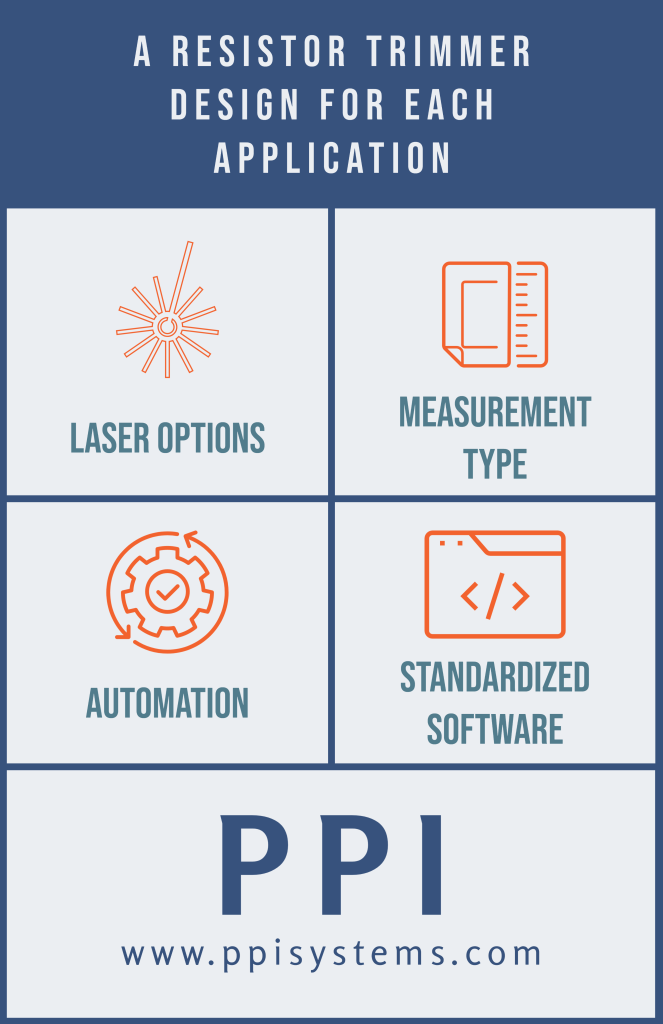
Each type of testing allows a contact with the device under test (DUT), but they do it in different ways that are application specific. Flying probes are an excellent choice for high-mix, low volume production runs.
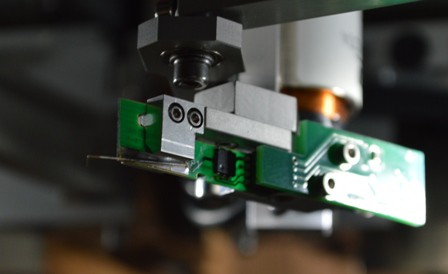
The four flying probes in a RapiTrim system use a range of tip sizes and materials for single or full Kelvin (double tip) probes.
Probe card systems were first introduced in the 1970’s and have evolved to provide fast test throughput for high volume of simple circuit or component layouts. This would apply to layouts that can be accommodated with a single probe card.
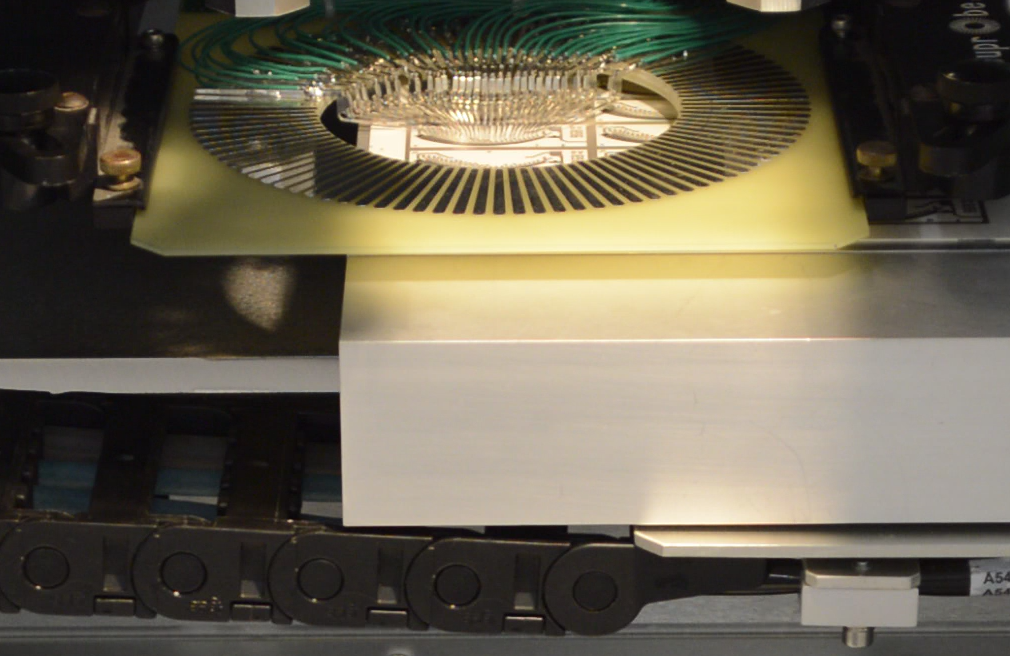
Pogo pins are spring-loaded connectors that have improved durability when compared to other type of electrical contacts. They are better able to manage mechanical shock and vibration. Each connector has an integrated spring which ensures the needed force with the contact plate. These pins have a low cost, are easy to source and form a strong, reliable connection.
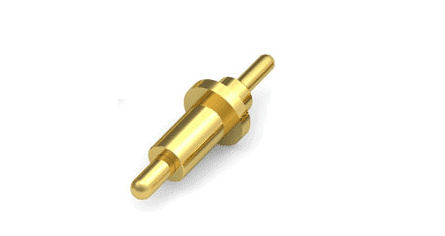
A typical pogo fixture is designed for backside contact, allowing full access for the laser from the top. Overhead time for flying probe motion or probe card step-and-repeat motion is eliminated. This arrangement often provides the highest throughput solution for those high volume jobs. The fixtures can be easily exchanged for different part designs.
Additionally, PPI Systems offers a wide variety of custom testing solutions which may incorporate a completely unique testing option or combinations of the previously noted testing types as specified by customer applications.
All RapiTrim systems can handle individual substrates up to 300×300 mm and can provide unique vacuum platen configurations as well as multi-up fixtures that cover a range of part sizes. Vacuum platen top fixture plates can be exchanged in seconds, minimizing unproductive overhead. With two fixtures, unloading and reloading of one fixture can occur while the second is being processed. This scheme provides high efficiency with much lower cost than full automation. Many different part sizes can be accommodated in this way.
Automatic part stack loading systems load and unload substrates with sizes up to 200×200 mm using a vacuum pickup. Cup locations are adjustable to accommodate small to maximum size substrates. Slipsheet handling is also available.
Systems contain two pickup heads, one for loading and one for unloading substrates. These substrate stacks (load and unload) are located at the front of the machine for easy access and exchange.
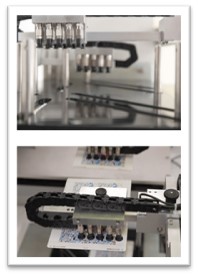
For substrates handled in magazines, PPI offers SMEMA-compatible solutions compatible with a range of magazine automation suppliers. These handlers may be specified by the customer and PPI can supply them as part of a turnkey system.
Substrates may be exchanged quickly, and with the right choice of magazine handler the option of multiple magazines allows hours of efficient, uninterrupted operation. Loading is provided by a short conveyor which is followed by a robot pick-and-place onto a vacuum platen or special fixture for trimming.
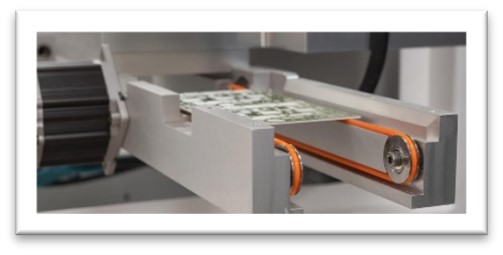
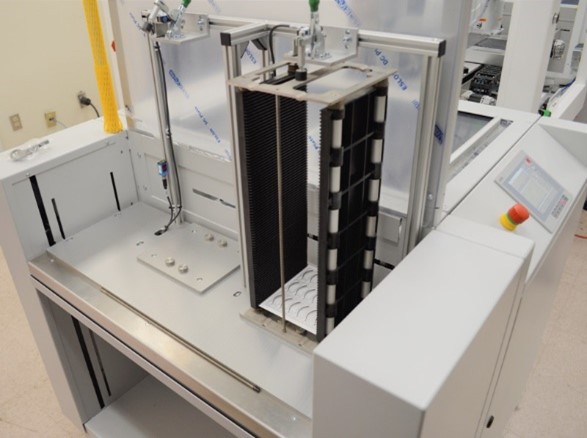
The magazine loading system including external magazine-to-conveyor loaders and unloaders are fully integrated (mechanically, electrically and software integration) by PPI into the operation of the RapiTrim laser resistor trimming system. All controls are then available through the one advanced ProSys user interface. Single sided automation is also available.
An in-line conveyorized substrate transport is another available configuration. This would use the same SMEMA-compatible hardware as the magazine loader, just without the magazine loading / unloading modules. Substrates are passed to the RapiTrim directly on the conveyor track and picked-and-placed by the robot onto the vacuum chuck (or another fixture if necessary). As with the magazine loader configuration, full line integration is achieved by following SMEMA standards, and the transport controls are fully integrated into the RapiTrim user interface.
If your requirements are not covered by one of the options above, don’t hesitate to contact PPI to discuss custom alternatives. PPI engineers can propose solutions for your unique needs, from custom fixturing to custom automation.
PPI Systems is a leading supplier of laser material processing and test systems. The company provides a broad range of turn-key solutions to the interconnect and electronic component market for via drilling, circuit processing, resistor trimming, and high-precision micro-machining.
ProSys resistor trimming system control software is an intuitive graphical user interface that allows complete machine setup, calibration control, job and process setting, vision and process map as well as status and diagnostic information. Regardless of system design, this interface remains the same, allowing users to transfer between different trimmers whether:
Job creation, process control and results are identical, reducing training times and ensuring operator proficiency for all applications including both high and low volumes and mixes.
